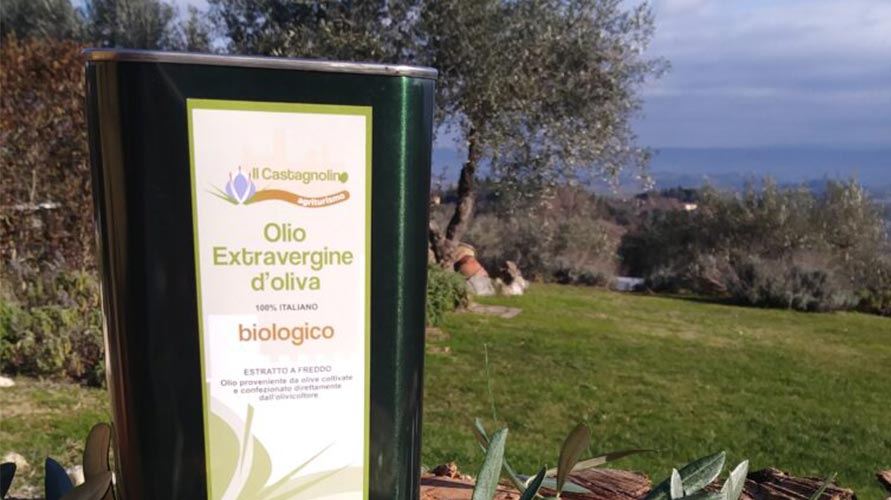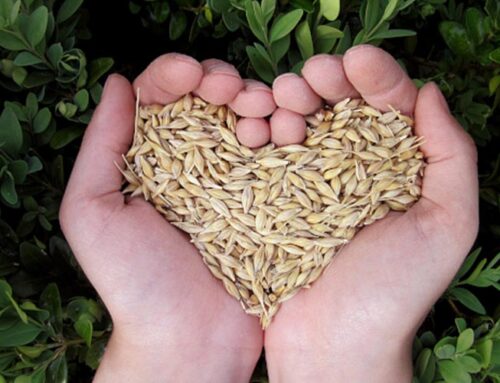It is a production method that protects the environment, nature and the agricultural landscape and promotes the maintenance and increase of the fertility of the land over time.
The farmer who wants to produce organically must comply with regulations and laws and is responsible for the compliance of the product.
By choosing an organic oil you can contribute to the natural restoration of the ecosystem.
The farmer is subjected to continuous checks during the production cycle. This guarantees a healthy product for a diet free from pesticide residues that are harmful to our health.
How to recognize organic extra virgin olive oil?
On the package you will find the European organic logo: a leaf formed by twelve white stars on a green background with a comet in the center. Next to it you will find the operator code and that of the control body.
Extra virgin olive oil in our diet.
Consuming extra virgin olive oil daily is important for our health.
The substances contained in it, such as oleic acid, polyphenols and vitamins, protect the stomach, stimulate the activity of the liver and intestines, help in the prevention of cardiovascular diseases. In short, it is a true food-medicine.
In the Mediterranean diet, oil is present in many dishes.
The Mediterranean Diet was registered in 2013 in the representative list of the intangible cultural heritage of humanity (UNESCO).
In the Mediterranean diet it is enough to go back to the foods of our tradition.
First of all, soups of all kinds and “unique dishes”, such as pasta and beans, pasta and chickpeas, rice and lentils (or peas) all dressed with extra virgin olive oil. It is also recommended for frying.
Fortunately, many of the Italian recipes, especially Tuscan ones, use oil instead of butter.
It must also be said that civilizations have developed around the olive tree in the Mediterranean. In addition to being a food, oil served as a bargaining chip, to illuminate and also to cure.
What is the right price for an organic extra virgin olive oil?
But how much a quality oil must cost is certainly not synonymous with certain data, but some factors of absolute importance must be taken into consideration.
To produce 1 liter of oil, about 6-8 kg of olives are needed, but this is a figure that can vary significantly depending on the climatic trend, type of cultivar, and when the olives are harvested.
The extra virgin olive oil is obtained solely from the pressing of the olive and various factors contribute to its cost. These include agronomic treatments such as pruning, fertilization, manual or mechanized harvesting methods, the geographical area of cultivation, milling, storage.
Taking into account all these variables it is difficult to give an equal price for all those Italian areas suited to the production of extra virgin olive oil.
In central Italy, all the regions have olive production and, where it stands out the most, are Lazio, Abruzzo and Tuscany.
Especially in the latter, harvesting is still almost entirely manual and the oil obtained is a product of high excellence.
The average price of a liter of quality extra virgin olive oil produced in central Italy is around 10-16 euros but with peaks that can even exceed 30 euros.
Where to buy Organic Extra Virgin Olive Oil?
It is possible to buy organic extra virgin olive oil directly from the producer on farms, in specialized stores or in small food shops around the house or even online on the producers’ websites.
If you are interested in buying our oil write to us https://www.sangimignano-ilcastagnolino.com/wp/it/impresa/olio-extravergine-di-oliva/
Oil tourism. In recent years, many tourist activities related to olive oil have sprung up, it is a new way of experiencing nature, the benefits of olive oil and enjoying accommodation immersed in olive groves such as farmhouses.
The “Open mills” events join with “Open cellars” where enthusiasts can taste the oils and follow the olive processing process, together with visits to centuries-old olive groves.




